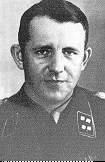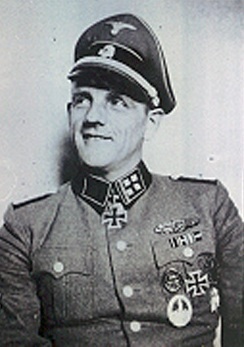
Ernst Kaltenbrunner was a high-ranking Austrian SS official during the Nazi era and a major perpetrator of the Holocaust. After the assassination of Reinhard Heydrich in 1942, and a brief period under Heinrich Himmler, Kaltenbrunner was the third Chief of the Reich Security Main Office (RSHA), which included the offices of Gestapo, Kripo and SD, from January 1943 until the end of World War II in Europe.

The Final Solution or the Final Solution to the Jewish Question was a Nazi plan for the genocide of individuals they defined as Jews during World War II. The "Final Solution to the Jewish question" was the official code name for the murder of all Jews within reach, which was not restricted to the European continent. This policy of deliberate and systematic genocide starting across German-occupied Europe was formulated in procedural and geopolitical terms by Nazi leadership in January 1942 at the Wannsee Conference held near Berlin, and culminated in the Holocaust, which saw the murder of 90% of Polish Jews, and two-thirds of the Jewish population of Europe.

Reinhard Tristan Eugen Heydrich was a high-ranking German SS and police official during the Nazi era and a principal architect of the Holocaust.

The Wannsee Conference was a meeting of senior government officials of Nazi Germany and Schutzstaffel (SS) leaders, held in the Berlin suburb of Wannsee on 20 January 1942. The purpose of the conference, called by the director of the Reich Security Main Office SS-Obergruppenführer Reinhard Heydrich, was to ensure the co-operation of administrative leaders of various government departments in the implementation of the Final Solution to the Jewish Question, whereby most of the Jews of German-occupied Europe would be deported to occupied Poland and murdered. Conference participants included representatives from several government ministries, including state secretaries from the Foreign Office, the justice, interior, and state ministries, and representatives from the SS. In the course of the meeting, Heydrich outlined how European Jews would be rounded up and sent to extermination camps in the General Government, where they would be killed.

Gustav Alfred Julius Meyer was a Nazi Party official and politician. He joined the Nazi Party in 1928 and was the Gauleiter of North Westphalia from 1931 to 1945, the Oberpräsident of the Province of Westphalia from 1938 to 1945 and the Reichsstatthalter of Lippe and Schaumburg-Lippe from 1933 to 1945. In 1941 he became the Permanent Deputy to the Reichsminister of the Reich Ministry for the Occupied Eastern Territories. He represented the ministry with Georg Leibbrandt in the January 1942 Wannsee Conference, at which the genocidal Final Solution to the Jewish Question was planned. Near the end of World War II in Europe, Meyer committed suicide in April 1945.

Rudolf Lange was a German SS functionary and police official during the Nazi era. With the invasion of the Soviet Union, he served in Einsatzgruppe A before becoming a commander in the Sicherheitsdienst (SD) and all RSHA personnel in Riga, Latvia. He participated in the January 1942 Wannsee Conference, at which the genocidal Final Solution to the Jewish Question was planned, and was largely responsible for implementing the murder of Latvia's Jewish population during the Holocaust.

Karl Eberhard Schöngarth was a German lawyer and SS-Brigadeführer in Nazi Germany. He was a war criminal who perpetrated mass murder and genocide in German-occupied Poland during the Holocaust. He participated in the January 1942 Wannsee Conference, at which the genocidal Final Solution to the Jewish Question was originally planned. After the war, Schöngarth and six others were tried for murdering an American pilot, Americo S. Galle, who was shot down over the Netherlands in November 1944. They were all found guilty. Schöngarth and four others were sentenced to death and executed in 1946.

The Reich Security Main Office was an organization under Heinrich Himmler in his dual capacity as Chef der Deutschen Polizei and Reichsführer-SS, the head of the Nazi Party's Schutzstaffel (SS). The organization's stated duty was to fight all "enemies of the Reich" inside and outside the borders of Nazi Germany.

Josef Bühler was a German lawyer who, as the protégé of Governor General Hans Frank, rose to become his deputy as the State Secretary in the Nazi Germany-controlled General Government in Kraków during the Second World War. He participated in the January 1942 Wannsee Conference, at which the genocidal Final Solution to the Jewish Question was planned. He was convicted of crimes against peace, war crimes and crimes against humanity, and was executed.

Wilhelm Stuckart was a German Nazi Party lawyer, official, and a State Secretary in the Reich Interior Ministry during the Nazi era. He was a co-author of the notorious Nuremberg Laws and a participant in the January 1942 Wannsee Conference, at which the genocidal Final Solution to the Jewish Question was planned. He also served as Reichsminister of the Interior in the short-lived Flensburg government at the end of the Second World War.

Friedrich Wilhelm Kritzinger was a German lawyer who became the State Secretary in the Reich Chancellery under Reichsminister Hans Lammers in Nazi Germany. He was Lammers' representative to the 20 January 1942 Wannsee Conference, at which the genocidal Final Solution to the Jewish Question was planned. He was arrested after the fall of the Nazi regime, incarcerated from 1945 to 1947 but released due to ill health and died without ever facing trial.

Franz Alfred Six was a Nazi official, promoter of the Holocaust and convicted war criminal. He was appointed by Reinhard Heydrich to head department Amt VII, Written Records of the Reich Security Main Office (RSHA). In 1940, he was appointed to direct state police operations in an occupied United Kingdom following invasion. In the post-war period, he worked as a public relations executive and a management consultant.
The Wannsee Conference is a 1984 German TV film portraying the events of the Wannsee Conference, held in Berlin in January 1942. The script is derived from the minutes of the meeting. Since no verbatim transcription of the meeting exists, the dialogue is necessarily fictionalised. The main theme of the film is the bureaucratic nature of the genocide.

Otto Adolf Eichmann was a German-Austrian official of the Nazi Party, an officer of the Schutzstaffel (SS), and one of the major organisers of the Holocaust. He participated in the January 1942 Wannsee Conference, at which the implementation of the genocidal Final Solution to the Jewish Question was planned. Following this, he was tasked by SS-Obergruppenführer Reinhard Heydrich with facilitating and managing the logistics involved in the mass deportation of millions of Jews to Nazi ghettos and Nazi extermination camps across German-occupied Europe. He was captured and detained by the Allies in 1945, but escaped and eventually settled in Argentina. In May 1960, he was tracked down and apprehended by Israel's Mossad intelligence agency, and put on trial before the Supreme Court of Israel. The highly publicised Eichmann trial resulted in his conviction in Jerusalem, following which he was executed by hanging in 1962.
The Stiftung Nordhav was a front organization of the Sicherheitsdienst (SD) founded in 1939 by Reinhard Heydrich to obtain and manage real estate for the SS.
Dramatic portrayals of Reinhard Heydrich number among the more numerous of any Second World War figure, comparable to Adolf Hitler as well as war films depicting Erwin Rommel. Reinhard Heydrich has been portrayed in both television and film, and was one of the few high ranking Nazis to be depicted in a dramatic film while the Second World War was still ongoing.

Reich Security Head Office Referat IV B4, known as RSHA IV B4, was a sub-department of Germany's Reich Security Head Office and the Gestapo during the Holocaust. Led by SS-Obersturmbannführer Adolf Eichmann, RSHA IV B4 was responsible for "Jewish affairs and evacuation" in German-occupied Europe, and specifically for the deportation of Jews from outside Poland to concentration or extermination camps. Within Poland, the liquidation of the ghettos and transport of Jews was handled by the SS and local police departments.
Die Wannseekonferenz, international title The Conference, is a German TV docudrama, first aired January 24, 2022 by the ZDF broadcaster, about the Wannsee Conference held in Berlin-Wannsee in 1942 to organise the extermination of the Jews.

Friedrich Suhr was a German lawyer and SS-Obersturmbannführer. He worked in the Reich Security Main Office under Adolf Eichmann. During the Second World War, he led Einsatzkommando death squads in Ukraine. He also served as the SiPo and SD commander in occupied France and was the SS and Police Leader in Oberelsaß. After the war, he committed suicide while in Allied custody.
Ingeburg Gertrud Werlemann was a German secretary and photographer. During the Second World War, she was a secretary to Adolf Eichmann and noted down the results of the talks at the Wannsee Conference in Berlin on 20 January 1942.














